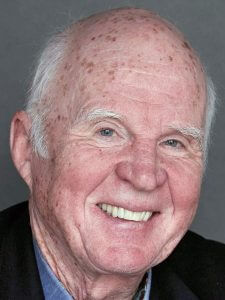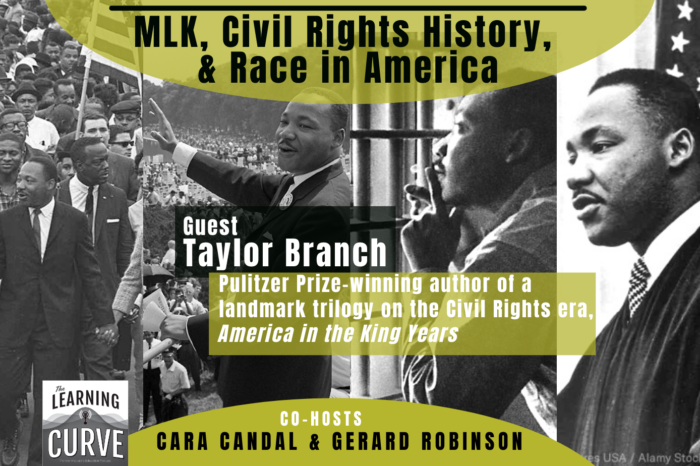Pulitzer Winner Taylor Branch on MLK, Civil Rights History, & Race in America
This week on “The Learning Curve,” Cara and Gerard are joined by Taylor Branch, Pulitzer Prize-winning author of a landmark trilogy on the Civil Rights era, America in the King Years. They discuss the life and legacy of the Rev. Dr. Martin Luther King, whose birthday the nation observed on Monday. They review Dr. King’s powerful, moving oratory, drawing on spiritual and civic ideals to promote nonviolent protest against racial injustice, and how, as head of the Southern Christian Leadership Conference, he shared leadership of the movement with organizations such as the Student Nonviolent Coordinating Committee. They also discuss the pivotal role that school-aged children played in the successes of the Civil Rights Movement, and how to talk with schoolchildren today about those heart-wrenching images such as six-year-old Ruby Bridges being escorted by U.S. marshals as she desegregated the New Orleans Public Schools, and young students facing Bull Connor’s dogs and fire hoses in Alabama. Branch shares thoughts on how to ensure that the women involved in the movement, including Septima Clark, Ella Baker, Rosa Parks, Fannie Lou Hamer, and Diane Nash, receive due credit for their contributions. He concludes with a reading from one of his books.
Stories of the Week: President-elect Biden is backing up his pledge to get kids back to school with a proposed $130 million in stimulus funds to cover the costs of reconfiguring K-12 classrooms, improving ventilation, personal protective equipment, and other social distancing requirements. Will the cash infusion work, and will support be offered to income-eligible private school students? A U.S. Government Accountability Office study takes a close look at school improvement efforts across all states, with some promising findings.
Guest:

Mandatory Credit: Photo by Taylor Jewell/ Invision/ AP/ REX/ Shutterstock (9330925k)
Executive Producer Taylor Branch
2018 Sundance Film Festival – “King in the Wilderness” Portrait Session, Park City, USA – 22 Jan 2018
Taylor Branch is a Pulitzer Prize-winning historian, best known for his landmark trilogy on the Civil Rights era, America in the King Years. The trilogy includes: Parting the Waters: America in the King Years, 1954-63; Pillar of Fire: America in the King Years, 1963-65; and At Canaan’s Edge: America in the King Years, 1965-1968. His most recent book is The King Years: Historic Moments in the Civil Rights Movement. In 2009, Branch wrote The Clinton Tapes: Wrestling History with the President. Branch began his career in 1970 as a staff journalist for The Washington Monthly, Harper’s, and Esquire. He holds honorary doctoral degrees from 10 colleges and universities. Other citations include the Dayton Literary Peace Prize Lifetime Achievement Award in 2008 and the National Humanities Medal in 1999. He lives in Baltimore, Maryland.
The next episode will air on Wednesday, January 27th, 2020 at 12 pm ET with guest, Arizona Supreme Court Justice Clint Bolick.
Tweet of the Week:
Important update: We will no longer offer SAT Subject Tests. (International students can still take them in May and June.)
We will also discontinue the optional SAT Essay after the June 2021 administration.
You can find additional details here. ?? https://t.co/qOB6WZrD5G
— College Board (@CollegeBoard) January 19, 2021
News Links:
GAO: Observations on States’ School Improvement Efforts
https://www.gao.gov/products/GAO-21-199#summary
Biden Proposes $175 Billion to Reopen Schools
Get Updates on Our Education Research
Recent Episodes:




















